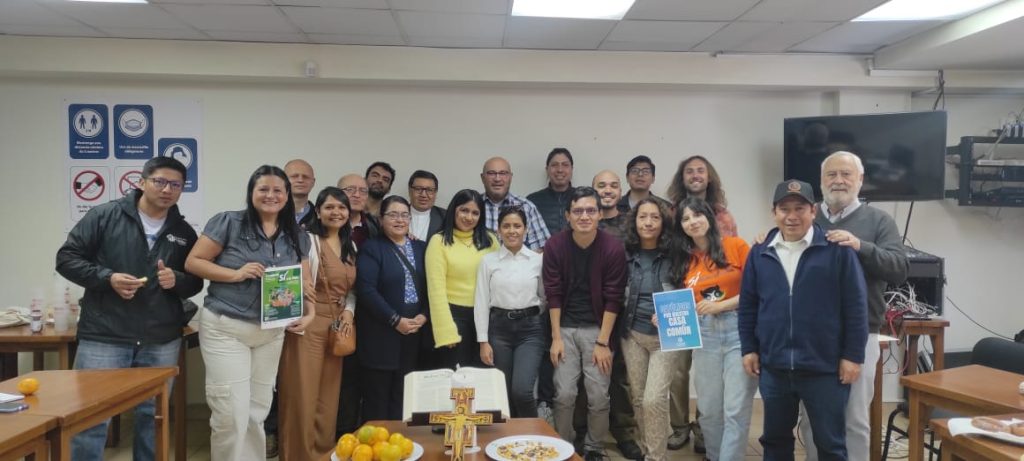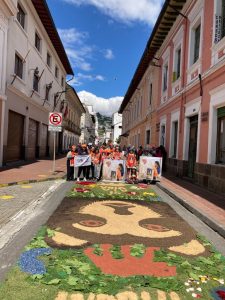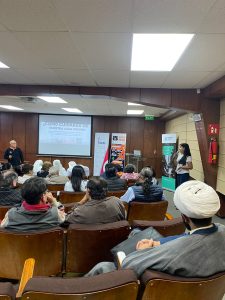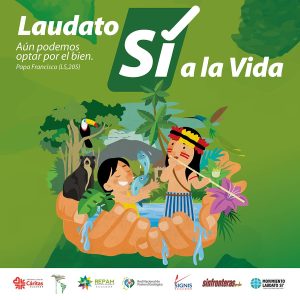
On August 20, Ecuadorian citizens voted “Yes to Yasuní” in the Popular Consultation (referendum) to preserve this natural reserve and chose to protect the Ecuadorian Amazon rainforest from oil extractivism by ceasing oil extraction operations in the National Park and preserving the reserves underground indefinitely.
What is Yasuní?
Yasuní is one of the most biodiverse regions in the world and home to the Waorani, Kichwa and Shuar Indigenous Peoples and borders the lands of other populations in voluntary isolation.
The area is a tropical rainforest of more than 1 million hectares in the heart of the Amazon that was declared a biosphere reserve in 1989 by UNESCO. It is home to more than 1,500 species of animals and several Indigenous Peoples – in addition to those already mentioned, the Tagaeri and Taromenane, the last populations in voluntary isolation in Ecuador.
For half a century several oil blocks with extractive activity have been threatening its survival. Block 43-ITT was the last to be exploited, with state-owned Petroecuador operating there since 2016.
What happened with the referendum?
 The “Yes” vote in the popular consultation is a historic event, a triumph for the dozens of environmental organizations that promoted the protection and conservation of sensitive and highly biodiverse ecosystems, such as the Andean Chocó (northwest of Quito), whose conservation was also submitted to popular consultation, and the Yasuní (in the Ecuadorian Amazon).
The “Yes” vote in the popular consultation is a historic event, a triumph for the dozens of environmental organizations that promoted the protection and conservation of sensitive and highly biodiverse ecosystems, such as the Andean Chocó (northwest of Quito), whose conservation was also submitted to popular consultation, and the Yasuní (in the Ecuadorian Amazon).
Laudato Si’ Movement’s role in conjunction with other organizations
Laudato Si’ Movement Ecuador Chapter in conjunction with the National Network of Ecological Pastoral (RENAPE) co-organized the campaign “Laudato Si’ a La Vida” (Laudato Si’ for Life), to raise awareness among citizens about the urgency of ecological conversion, developing various initiatives and events during which the “Yes” vote was promoted.
Among the initiatives organized was the release of the documentary “The Letter”, in Quito, with the participation of several groups and the general public; and the creation of a tapestry with the design of the “Andean bear” in the “Corpus Christi” procession in the streets of the historic center of Quito. At the same time, a press conference was held with the participation of the Amazonian bishop Adalberto Jiménez and other authorities, as well as other bishops’ public pronouncement.
 In the ecumenical sphere, dialogues were held with religious community leaders; participants took part in the “Alejandro and Inés Walk” in defense of the Amazon. In the academic sector, the event “Weaving Territories of Life: Interdisciplinary Perspectives on the Extractivist Development Model”, promoted by the Salesian Polytechnic University of Quito, was held.
In the ecumenical sphere, dialogues were held with religious community leaders; participants took part in the “Alejandro and Inés Walk” in defense of the Amazon. In the academic sector, the event “Weaving Territories of Life: Interdisciplinary Perspectives on the Extractivist Development Model”, promoted by the Salesian Polytechnic University of Quito, was held.
Support for advocacy against extractivism in Ecuador reached Pope Francis when Patricia Gualinga (an Indigenous leader) presented him with two T-shirts in support of the Andean Chocó during a private audience in June 2023. In addition, the popular consultations were promoted at the World Youth Day in Lisbon, from July 23 to August 8.
In synodality, the RENAPE organizations supported this work for the common good based on freedom and love of nature, which prompted many people to vote yes.
The work was strengthened through strategic alliances and agreements with different organizations such as Quito Sin Minería (QSM), Yasunidos, Fraternidad Ecuménica Ecuatoriana, the Focolare Movement, Pontificia Universidad Católica del Ecuador, Universidad Politécnica Salesiana, Fundación Arcandina and all the members of the National Ecological Pastoral Network: World Catholic Association for Communication (SIGNIS Ecuador), Sin Fronteras, Pastoral Social CÁRITAS Ecuador, Iglesias y Minería, and the Pan‑Amazonian Ecclesial Network (REPAM).
Yasuní’s fate
After the “Yes to Yasuní” victory with around 60% of the electorate’s support, President Guillermo Lasso gave indications that he was not willing to accept the popular mandate; but the mobilization of the coalition of organizations that supported the campaign was more powerful and they remain alert and vigilant to demand compliance with the referendum with the present government and the upcoming administration.
 The actions of Laudato Si’ Movement Ecuador and other allied organizations have marked a “before and after” in encouraging citizens to raise awareness about the urgency of climate justice and ecological conversion. Although the struggles may seem like David against Goliath, Ecuador is an example that God makes justice prevail and listens to the cry of the poor and the earth.
The actions of Laudato Si’ Movement Ecuador and other allied organizations have marked a “before and after” in encouraging citizens to raise awareness about the urgency of climate justice and ecological conversion. Although the struggles may seem like David against Goliath, Ecuador is an example that God makes justice prevail and listens to the cry of the poor and the earth.
The Ecuadorian example has been so striking that the citizens’ movements leading the United Nations Climate Change Conference, which will meet in the Brazilian Amazon in November 2025, are talking about “yasunizing” COP30.
In other words, the synodal methodology of RENAPE, territorialized in specific contexts, becomes a guideline for weaving networks that safeguard life and prophetic encouragement to communities threatened by the impacts of capitalism as in Panama, Argentina, Colombia, Guatemala, Dominican Republic and, in general, in every corner of our continent that continues to be considered a warehouse of “natural resources” and not an Eden of this marvelous creation of the precious community of infinite love.
To pioneer, to wander, to “amazonize”, to “yasunize”, to “laudatosify”, to “fratellitutticize”, to “samaritanize”—all verbs that lead to the transforming fullness of evangelizing in order to sing Laudate Deum with all people of good will.
Follow LSM Ecuador on their networks for more information:





